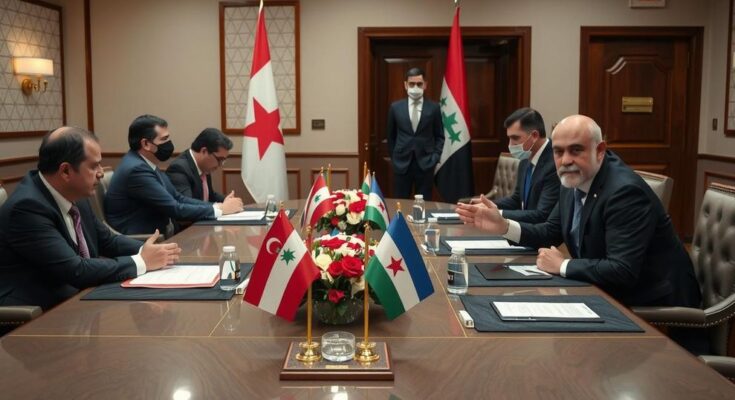U.S., Turkey, and Arab officials have pledged support for a peaceful transition in Syria during talks in Jordan. Concerns about chaos and sectarian division were voiced, emphasizing the need for an inclusive government and preservation of existing institutions. Direct contacts with the rebel group HTS were confirmed, despite skepticism about their commitment to a peaceful resolution. Key players like Iran and Russia were notably absent from discussions.
Officials from the United States, Turkey, and various Arab nations have united to endorse a peaceful transition in Syria, articulated during a recent summit in Aqaba, Jordan. The Jordanian Foreign Minister, Ayman Safadi, emphasized the collective desire among regional powers to prevent Syria from spiraling into chaos. U.S. Secretary of State Antony Blinken acknowledged direct communications with the rebel faction Hayat Tahrir al-Sham (HTS), which played a pivotal role in the overthrow of President Bashar al-Assad’s regime.
A formal communique issued at the conclusion of this meeting called for fostering an inclusive Syrian government that honors minority rights and refrains from providing refuge for terrorist organizations. In light of Syria’s recent tumultuous developments, the participants advocated for a governance structure reflecting the interests of all Syrians. Fuad Hussein, the Iraqi Foreign Minister, expressed regional apprehension about Syria’s future, cautioning against a recurrence of the turbulence witnessed in Libya following Colonel Gaddafi’s expulsion.
Turkish Foreign Minister Hakan Fidan remarked on the necessity of preserving and reforming existing Syrian institutions to prevent terrorism from exploiting the transition period. He urged concerted efforts, noting historical lessons learned from previous conflicts. Despite HTS’s express commitment to forming an inclusive government, skepticism remains due to the group’s violent history. While discussing these efforts, Secretary Blinken affirmed that the U.S. has remained in direct contact with HTS concerning significant issues, including the case of missing American journalist Austin Tice, notwithstanding the continued designation of HTS as a terrorist organization.
Notably absent from the discussions were representatives from Syria, alongside Iran and Russia, both of which have supported Assad’s regime in the past. The foreign ministers from attending Arab states expressed a unified intent to ensure the integrity of Syria, warning against potential sectarian fragmentation that could further jeopardize the nation. The ongoing involvement of external forces in Syria highlights the critical need for both internal and external cohesion to nurture the hopes of the Syrian populace in the aftermath of recent events.
Syria has been engulfed in a protracted civil war since 2011, leading to significant humanitarian crises and widespread violence. The conflict saw the rise of various rebel factions, alongside complicated geopolitical dynamics involving numerous countries, including the U.S., Turkey, Iran, and Russia. Recent changes in Syria’s political landscape have prompted discussions among regional powers regarding the establishment of a governance framework that promotes unity and stability, steering away from sectarian divisions and potential chaos reminiscent of other conflict-ridden states.
The collective stance of the United States, Turkey, and Arab states to support a peaceful transition in Syria underscores the urgency of resolving the ongoing conflict through inclusive governance. Ensuring minority rights and preventing the rise of terrorism are central to these discussions. The absence of key figures from the Syrian government and influential nations like Iran and Russia highlights the complex nature of the diplomatic landscape, while the commitment to foster regional stability remains a crucial objective for the future of Syria.
Original Source: www.bbc.com




